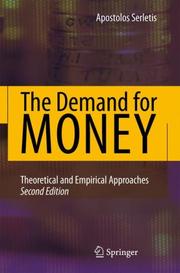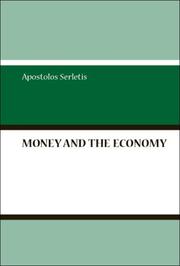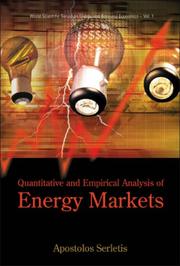| Listing 1 - 10 of 13 | << page >> |
Sort by
|

ISBN: 1280937270 9786610937271 0387717277 0387717269 1441944060 Year: 2007 Publisher: New York : Springer,
Abstract | Keywords | Export | Availability | Bookmark
 Loading...
Loading...Choose an application
- Reference Manager
- EndNote
- RefWorks (Direct export to RefWorks)
The Demand for Money: Theoretical and Empirical Approaches 2nd Edition by Apostolos Serletis This book provides an account of the existing literature on the demand for money. It shows how the money demand function fits into static and dynamic macroeconomic analyses and discusses the problem of the definition (aggregation) of money. Professor Serletis takes a microeconomic- and aggregation-theoretic approach to the demand for money, presents empirical evidence using recent state-of-the-art econometric methodology, and recognizes the existence of unsolved problems and the need for further developments. New to this Edition increased coverage of theoretical and empirical approaches to the demand for money, including a new chapter on cross-country evidence a new chapter on money demand issues and estimation of the welfare cost of inflation using tools from public finance and applied microeconomics a new chapter on rational expectations macroeconomics and issues such as the Lucas critique, rules versus discretion, and time inconsistency increased coverage of the univariate and multivariate properties of the money demand variables, nonlinear chaotic dynamics, and self-organized criticality revised coverage of monetary asset demand systems based on locally and globally flexible functional forms increased coverage of the econometrics of demand systems highlighting the challenge inherent with achieving both economic and econometric regularity "This new edition of The Demand for Money contains the tools and the direction needed for future productive advances in monetary economics. There is no clearer or more comprehensive road map to the field's "high road" research." -William A. Barnett, Oswald Distinguished Professor of Macroeconomics, University of Kansas, and Editor of the journal, Macroeconomic Dynamics "The second edition contains new theoretical and empirical results on the theory of the demand for money. Serletis expands on the base that he created in his first edition. New results on the estimation of flexible monetary asset demand systems are included in this edition as well as new time series econometric techniques. This book is a significant contribution to macroeconomics, and provides a basis for graduate students from which they can start their own research." -Melvin J. Hinich, Department of Government & Department of Economics, The University of Texas at Austin.
Macroeconomics. --- Economic policy. --- Economic theory. --- Business. --- Macroeconomics/Monetary Economics//Financial Economics. --- Economic Policy. --- Economic Theory/Quantitative Economics/Mathematical Methods. --- Business and Management, general. --- Trade --- Economics --- Management --- Commerce --- Industrial management --- Economic theory --- Political economy --- Social sciences --- Economic man --- Economic nationalism --- Economic planning --- National planning --- State planning --- Planning --- National security --- Social policy --- Management science. --- Quantitative business analysis --- Problem solving --- Operations research --- Statistical decision --- Demand for money. --- Monetary policy.

ISBN: 9812568182 9786611924805 1281924806 9812773509 9789812773500 9789812568182 9781281924803 Year: 2006 Publisher: Hackensack, NJ : World Scientific Pub.,
Abstract | Keywords | Export | Availability | Bookmark
 Loading...
Loading...Choose an application
- Reference Manager
- EndNote
- RefWorks (Direct export to RefWorks)
Demand for money. --- Money supply. --- Monetary policy. --- Demand for money --- Money supply --- Monetary policy --- Finance --- Business & Economics --- Money --- AA / International- internationaal --- 333.400 --- 332.4 --- Monetary management --- Economic policy --- Currency boards --- Money stock --- Quantity of money --- Supply of money --- Liquidity preference --- Geldwezen: algemeenheden. --- Geldwezen: algemeenheden
Book
ISBN: 1280669764 9786613646699 9814374377 9789814374378 9814374369 9789814374361 9781280669767 6613646695 Year: 2012 Publisher: Singapore : World Scientific Pub. Co.,
Abstract | Keywords | Export | Availability | Bookmark
 Loading...
Loading...Choose an application
- Reference Manager
- EndNote
- RefWorks (Direct export to RefWorks)
Interfuel substitution is an issue that is - and will likely remain - an important topic of inquiry for many years, as governments around the world seek to set policies that are intended to restrain carbon emissions or steer economies toward or away from certain fuels. This book contributes to this issue by estimating short- and long-term interfuel substitution elasticities, at the aggregate and sector levels, through the use of the latest advances in microeconometrics as well as recent international data for a number of OECD and non-OECD countries.
Fuel switching. --- Alternate fuel --- Alternative fuel --- Fuel interchangeability --- Fuel substitution --- Interchangeability of fuels --- Substitution of fuels --- Switching of fuels --- Substitute products --- Energy transition --- Alternative fuels
Book
ISBN: 9814436216 9789814436212 Year: 2013 Publisher: New Jersey: World scientific,
Abstract | Keywords | Export | Availability | Bookmark
 Loading...
Loading...Choose an application
- Reference Manager
- EndNote
- RefWorks (Direct export to RefWorks)
Digital
ISBN: 9780387717272 Year: 2007 Publisher: Boston, MA Springer Science+Business Media, LLC
Abstract | Keywords | Export | Availability | Bookmark
 Loading...
Loading...Choose an application
- Reference Manager
- EndNote
- RefWorks (Direct export to RefWorks)
Macroeconomics --- Quantitative methods (economics) --- macro-economie --- econometrie

ISBN: 9789812704740 Year: 2007 Publisher: Singapore World Scientific
Abstract | Keywords | Export | Availability | Bookmark
 Loading...
Loading...Choose an application
- Reference Manager
- EndNote
- RefWorks (Direct export to RefWorks)

ISBN: 9780387717265 Year: 2007 Publisher: New York Springer
Abstract | Keywords | Export | Availability | Bookmark
 Loading...
Loading...Choose an application
- Reference Manager
- EndNote
- RefWorks (Direct export to RefWorks)
Book
ISBN: 9789814390675 Year: 2013 Publisher: Singapore World scientific
Abstract | Keywords | Export | Availability | Bookmark
 Loading...
Loading...Choose an application
- Reference Manager
- EndNote
- RefWorks (Direct export to RefWorks)
Macroeconomics --- Petroleum industry and trade --- Petroleum products --- Petroleum reserves --- Econometric models --- Prices

ISBN: 1281121401 9786611121402 9812770461 9789812770462 9789812704740 9812704744 9781281121400 Year: 2007 Publisher: Hackensack, N.J. : World Scientific,
Abstract | Keywords | Export | Availability | Bookmark
 Loading...
Loading...Choose an application
- Reference Manager
- EndNote
- RefWorks (Direct export to RefWorks)
Bringing together leading-edge research and innovative energy markets econometrics, this book collects the author's most important recent contributions in energy economics. In particular, the book:. applies recent advances in the field of applied econometrics to investigate a number of issues regarding energy markets, including the theory of storage and the efficient markets hypothesis. presents the basic stylized facts on energy price movements using correlation analysis, causality tests, integration theory, cointegration theory, as well as recently developed procedures for testing for sh
Book
Year: 2009 Publisher: Washington, D.C., The World Bank,
Abstract | Keywords | Export | Availability | Bookmark
 Loading...
Loading...Choose an application
- Reference Manager
- EndNote
- RefWorks (Direct export to RefWorks)
This paper estimates interfuel substitution elasticities in selected developing and industrialized economies at the national and sector levels. In doing so, it employs state-of-the-art techniques in microeconometrics, particularly the locally flexible normalized quadratic functional forms, and provides evidence consistent with neoclassical microeconomic theory. The results indicate that the interfuel substitution elasticities are consistently below unity, revealing the limited ability to substitute between major energy commodities (i.e., coal, oil, gas, and electricity). While the study finds some evidences of larger interfuel substitution potential in high-income economies as compared to that in the middle- and low-income economies in the industrial and transportation sectors, no such evidence is observed in the residential and electricity generation sectors or at the national level. The implication is that interfuel substitution depends on the structure of the economy, not the level of economic development. Moreover, a higher change in relative prices is needed to induce switching toward a lower carbon economy.
Approach --- Availability --- Clean energy --- Climate change --- Climate change policy --- Coal --- Demand for energy --- Electricity --- Electricity generation --- Energy --- Energy and Environment --- Energy consumption --- Energy Demand --- Energy demand --- Energy Production and Transportation --- Environment --- Environment and Energy Efficiency --- Fuel --- Fuel prices --- Fuel quantities --- Fuels --- Gas --- Natural gas --- Oil --- Oil price --- Quantity of fuel
| Listing 1 - 10 of 13 | << page >> |
Sort by
|

 Search
Search Feedback
Feedback About UniCat
About UniCat  Help
Help News
News